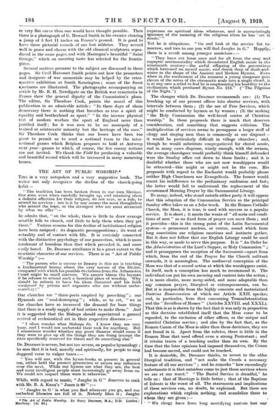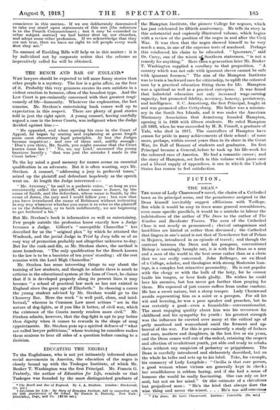THE ART OF PUBLIC WORSHIP.*
This is a very outspoken and a very suggestive book. The writer not only recognizes the decline of the church-going habit " The tradition has been broken down in our own lifetime. Our sons, even when carefully brought up, and retaining often a definite affection for their religion, do not care, as a rule, to attend its services : nor is it by any means the most thoughtless who attend the least, or the strongest who are most attracted by what we offer "— he admits that, "on the whole, there is little to draw average sensible folk to church, and little to help them when they get there." Various reasons for this decline of institutional religion have been assigned : its dogmatic presuppositions ; its want of actuality and of contact with life. It is certainly connected with the distinctive psychology of our generation, which is more intolerant of boredom than that which preceded it, and more easily bored. Dr. Dearmer attributes it to a great extent to the inartistic character of our services. There is an "Art of Public Worship" :— "The parson who is untrue to Beauty in this art is teaching a fundamental heresy about the very nature of the Divine, compared with which his possible deviations from the Athanasian Creed might be small matters. We cannot blame the layman if he refuses to attend such a heretical place of worship. Why should he submit to have his ideas distorted and his faith weakened by priests and organists who are without understancling ?"
Our churches are "three-parts emptied by preaching" ; our Hymnals are " soul-destroying " ; while, as to art, "we in the churches have so increased the demand for base things that there is a ready supply of bad artists to make them." And it is suggested that the Bishops should superintend a general revival of ecclesiastical art in their respective dioceses :—
"I often wonder what Bishops do. I know they are very busy, and I would not undertake their task for anything. But I sometimes wonder whether any great disaster would come if they were to give up all the things they are doing (except the rites specifically reserved for them) and do something else."
Dr. Dearmer is severe, but not too severe, on popular hymnology; he sees that it is bad, morally and spiritually, for people to sing doggerel verse to vulgar tunes :—
"You will not, with the hymn-books at present in general use, either hold the present generation or secure any influence over the next. While our hymns are what they are, the best and most intelligent people must increasingly go away from us. We could not respect them were it otherwise.
While, with regard to music, "Jangler in G" deserves to rank with Mr. R. A. Knox's "Jones is 60 " :—
" Jangler in G ' is what you find wherever you go, and our cathedral libraries are full of it. Nobody likes it ; Jangler • The Art of Public 1Forthip. By Percy Dearmer, M.A.; D.D. London': Xowbray. [4s. 64.1
expresses no spiritual ideas whatever, and is excruciatingly ignorant of the meaning of the religious ideas he has 'set tc music.' " Yet he is ubiquitous. "Go and look at the service list tomorrow, and two to one you will find Jangler in G." Happily, there is a revolt among younger musicians :—
" They have cut loose once and for all from the easy and eupeptic sentimentality which devastated English music in the
nineteenth century—the awful offspring of the generations
which battened on sacred music, and drank deep of slush-andwater in the shape of the Ancient and Modern Hymns. Even
when in. the excitement of the moment a young composer puts eleven of the notes of the chromatic scale into a single chord, it is at any rate a relief to feel he is emphasizing his 'hostility to the civilization which produced Hymn No. 223." (" The Pilgrims of the Night.")
The changes which Dr. Dearmer recommends are : (1) The breaking up of our present offices into shorter services, with
intervals between them ; (2) the use of Free Services, which might be conducted by laymen or by women ; (3) the making "the Holy Communion the well-loved centre of Christian worship." In these proposals there is much that deserves consideration, and something that suggests criticism. Thp.
multiplication of services seems to presuppose a larger staff of clergy and singing men than is commonly at our disposal—.
it would be particularly difficult in village churches ; and, though he would substitute congregational for choral music, and in many cases dispense, wisely enough, with the sermon, the average churchgoer would probably think himself defrauded.
were the Sunday office cut down to those limits ; and it is doubtful whether those who are not now worshippers would be attracted—this might or might not be the case. His proposals with regard to the Eucharist would probably please neither High Churchmen nor Evangelicals. The former would resent his indifference to the preliminary confession and fast; the latter would fail to understand the replacement of the accustomed Morning Prayer by the Sacramental Liturgy.
To many, indeed, who stand outside either party it will appear that this adoption of the Communion Service as the principal Sunday office takes us on a false track. In the Roman Catholic Church, the Mass, it is true, is used with success as a popular service. It is short ; it meets the wants of " all sorts and conditions of men" as no fixed form of prayer can meet them ; and it provides—this is the strong point of the Latin Sacramental system—a permanent nucleus, or centre, round which from long association our religious emotions and instincts gather. But it does not follow that our English Liturgy could be used in this way, or made to serve this purpose. It is "An Order for the Administration of the Lord's Supper, or Holy Communion " ; and it presupposes the reception of the Sacrament—apart from which, from the end of the Prayer for the Church militant onwards, it is meaningless. The mediaeval conception of the Mass was that of a sacred action at which the worshippers assist. In itself, such a conception has much to recommend it. The individual can put his own meaning and content into the action ; it is more elastic, more many-sided, and more adaptable than any common prayer, liturgical or extemporaneous, can be. But it is inseparable from the highly concrete and materialized Dodrina Romanensium of which our Article XXIL speaks ; and, in particular, from that concerning Transubstantiation and the "Sacrifices of Masses" (Articles XXVIII. and XXXI.). That this is so is shown by the fact that it was only in proportion as this doctrine esIablished itself that the Mass came to be regarded, to the exclusion of other offices, as the unique and essential Christian service ; and also by the fact that, as the Roman Canon of the Mass is older than these doctrines, they are not found in it. Apart from the rubrics, there is little in the Roman Mass that need offend even a strong Protestant ; and it retains traces of a teaching earlier than its own. By the time that the later opinions had imposed themselves, the Canon had become sacred, and could not be touched.
It is desirable, Dr. Dearmer thinks, to revert to the older liturgical tradition, and "not make the Creeds a necessary feature of all our services " ; and he remarks "how exceedingly unfortunate it is that outsiders come to just those services where we are at our worst." "The Burial Service is dreadful," ho tells us : that of Marriage is little better ; that of the Baptism of Infants is the worst of all. The statements and implications of these services can, no doubt, be explained. But there are explanations which explain nothing, and scandalize those to
whom they are given :— 4 • "We clergy have from long mortifying custoinlost our
conscience in this matter.If we are deliberately determined to take our stand upon statements of this sort (the reference is to the Fourth Commandment ; but it may be extended to other subject matter] we had better shut up our churches, and adopt some other profession. If we acknowledge that they are not true, then we have no right to tell people every weok that they are."
No amount of Enabling Bills will help us in this matter : it is by individual not by corporate action that the reforms so imperatively called for will be obtained.



































 Previous page
Previous page